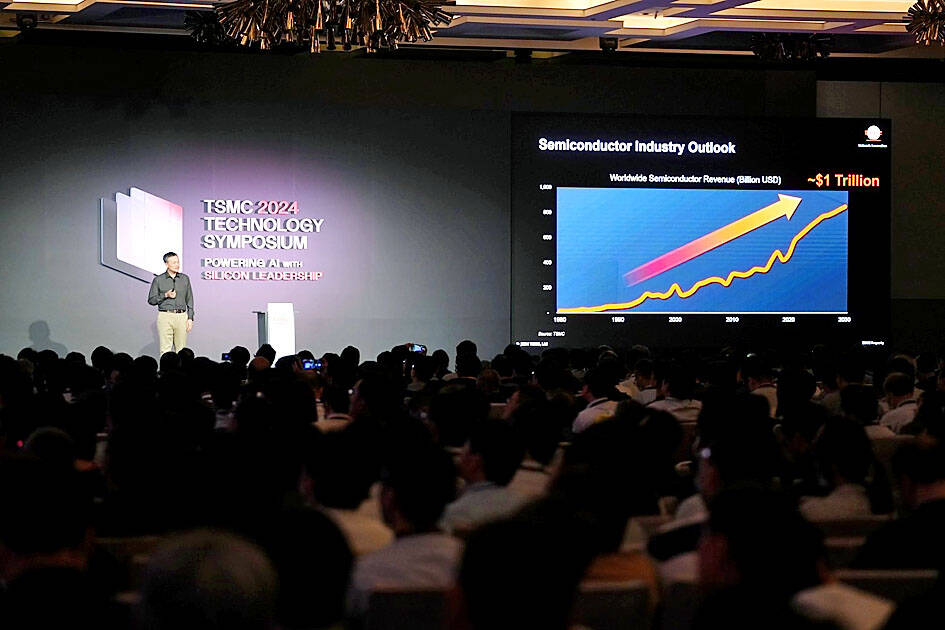Taiwan Semiconductor Manufacturing Co (TSMC, 台積電) , the world’s biggest contract chipmaker, yesterday said a surge in artificial intelligence (AI) server demand would fuel global semiconductor revenue growth this year at an annual rate of about 10 percent, excluding the memorychip sector.
“We are seeing very strong AI server demand. We are looking at a yearly growth rate of 2.5 times higher than last year,” TSMC deputy cochief operating officer Cliff Hou (侯永清) said during an annual technology symposium in Hsinchu.
The industry’s growth would also be aided by a mild recovery in smartphone and PC demand, both estimated to increase shipments by 1 to 3 percent this year from last year, shrugging off the prolonged inventory-driven slump, he said.

Photo: Grace Hung, Taipei Times
Automotive chip shipments are to dip as much as 11 percent annually this year, Hou said.
Internet of Things shipments are to decelerate to between 7 percent and 9 percent this year, compared with 20 percent a year in the past, he said.
For the foundry sector, where TSMC commands about 60 percent market share, the growth would be even faster at an annual pace of between 15 percent and 20 percent by revenue, Hou said.
TSMC would outgrow its peers, with a growth target of low-to-mid 20 percent annually this year, company CEO C.C. Wei (魏哲家) told investors last month.
The chipmaker supplies a majority of AI chips used in servers and data centers, including those from Nvidia Corp and AMD Inc, utilizing its advanced 4-nanometer process technology.
TSMC said the AI boom could be attributed to the evolution of advanced semiconductor technologies, given the ever-growing demand for computing power.
The steep curve of surging AI computing power demand felt like the rally of Nvidia’s stock price lately, TSMC deputy cochief operating officer Kevin Zhang (張曉強) said during the technology symposium yesterday.
Nvidia is TSMC’s most important customer in the high-performance-computing (HPC) area, Zhang said.
The computing power of Nvidia’s new Blackwell graphics processing unit (GPU) for servers, made on TSMC’s 4-nanometer technology, has soared 1,000 times compared with Nvidia’s previous GPU made on 7-nanometer technology four or five years ago, Zhang said.
Fast-growing demand for HPC and mobile devices also prompted TSMC to triple its advanced 3-nanometer technology capacity this year, Y. K. Hwang (黃遠國), a senior director in charge of TSMC’s first 3-nanometer manufacturing fab, Fab18 B, said during the symposium.
During the period of 2020 to this year, TSMC is to expand advanced capacity by an annual compound growth rate of 25 percent, including 3-nanometer, 5-nanometer and 7-nanometer chips, Hwang said.
TSMC is also stepping up new fab constructions to catch up with customers’ rising demand.
This year, the chipmaker plans to build seven factories, including three wafer manufacturing fabs, two chip packaging plants in Taiwan and two wafer manufacturing fabs overseas, Hwang said.
TSMC built three fabs last year, four fabs in 2022, and two fabs a year on average from 2017 to 2019, he said.
The company also plans to expand chip-on-wafer-on-substrate capacity at an annual compound growth rate of 60 percent through 2026, in order to cope with high demand for HPC and AI applications, Hwang said.

Shiina Ito has had fewer Chinese customers at her Tokyo jewelry shop since Beijing issued a travel warning in the wake of a diplomatic spat, but she said she was not concerned. A souring of Tokyo-Beijing relations this month, following remarks by Japanese Prime Minister Sanae Takaichi about Taiwan, has fueled concerns about the impact on the ritzy boutiques, noodle joints and hotels where holidaymakers spend their cash. However, businesses in Tokyo largely shrugged off any anxiety. “Since there are fewer Chinese customers, it’s become a bit easier for Japanese shoppers to visit, so our sales haven’t really dropped,” Ito

The number of Taiwanese working in the US rose to a record high of 137,000 last year, driven largely by Taiwan Semiconductor Manufacturing Co’s (TSMC, 台積電) rapid overseas expansion, according to government data released yesterday. A total of 666,000 Taiwanese nationals were employed abroad last year, an increase of 45,000 from 2023 and the highest level since the COVID-19 pandemic, data from the Directorate-General of Budget, Accounting and Statistics (DGBAS) showed. Overseas employment had steadily increased between 2009 and 2019, peaking at 739,000, before plunging to 319,000 in 2021 amid US-China trade tensions, global supply chain shifts, reshoring by Taiwanese companies and

Taiwan Semiconductor Manufacturing Co (TSMC, 台積電) received about NT$147 billion (US$4.71 billion) in subsidies from the US, Japanese, German and Chinese governments over the past two years for its global expansion. Financial data compiled by the world’s largest contract chipmaker showed the company secured NT$4.77 billion in subsidies from the governments in the third quarter, bringing the total for the first three quarters of the year to about NT$71.9 billion. Along with the NT$75.16 billion in financial aid TSMC received last year, the chipmaker obtained NT$147 billion in subsidies in almost two years, the data showed. The subsidies received by its subsidiaries —

Taiwan Semiconductor Manufacturing Co (TSMC) Chairman C.C. Wei (魏哲家) and the company’s former chairman, Mark Liu (劉德音), both received the Robert N. Noyce Award -- the semiconductor industry’s highest honor -- in San Jose, California, on Thursday (local time). Speaking at the award event, Liu, who retired last year, expressed gratitude to his wife, his dissertation advisor at the University of California, Berkeley, his supervisors at AT&T Bell Laboratories -- where he worked on optical fiber communication systems before joining TSMC, TSMC partners, and industry colleagues. Liu said that working alongside TSMC